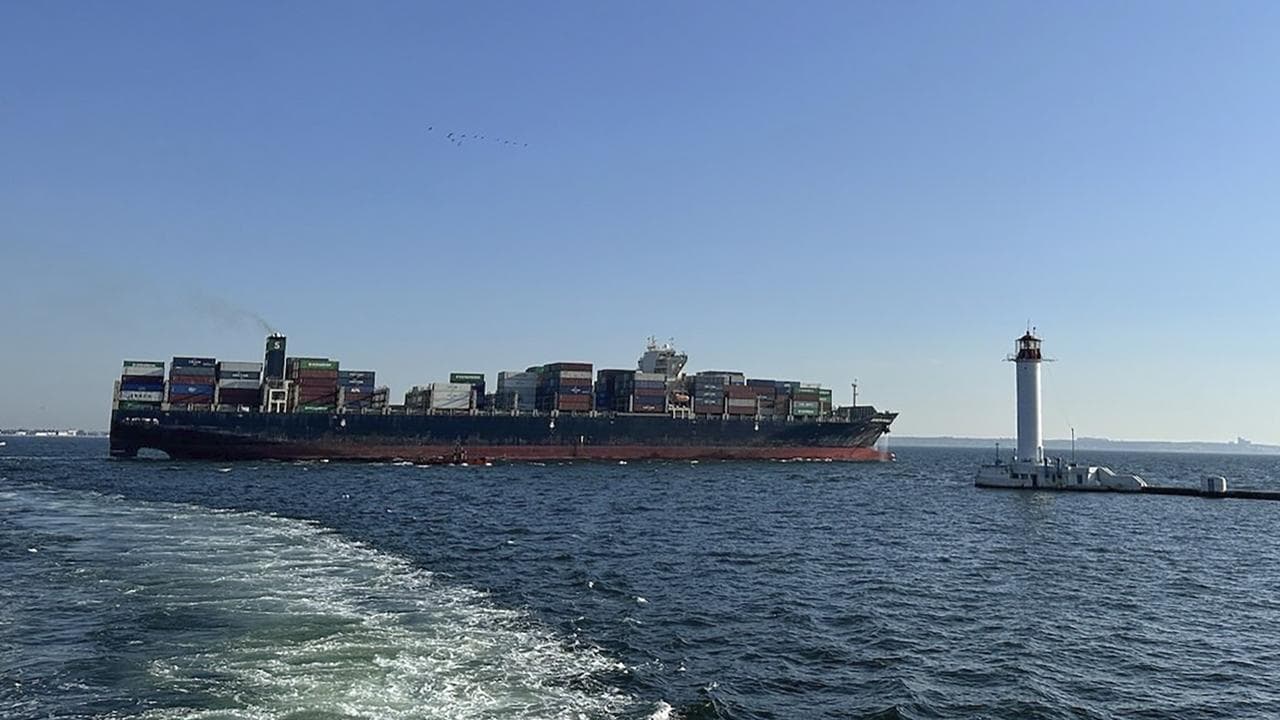
Ukraine says Russia has attacked its grain storage facilities, but a container ship has left the Black Sea port of Odesa despite Moscow's threat to target shipping after it abandoned an export deal.
In the Russian capital, five sources said authorities were considering reimposing stringent capital controls as the rouble showed the strains of Russia's invasion of its neighbour, which has brought huge military spending and Western sanctions.
The departure from Odesa on Wednesday of the Hong-Kong-flagged Joseph Schulte, trapped in the port since Russia invaded Ukraine on February 24 last year, followed the latest Russian attack on the country's grain export infrastructure.
Overnight air strikes damaged silos and warehouses at Reni on the Danube river, a vital wartime route for food exports, Ukrainian officials said. They posted photos of destroyed storage facilities and piles of scattered grain and sunflowers.
There was no comment from Moscow. An industry source said the port was continuing operations, tempering a rise in benchmark wheat prices in Chicago off their two-month low.
Russia has made regular air strikes on Ukrainian ports and grain silos since mid-July, when it pulled out of the UN-backed deal for Ukraine to export grain.
Moscow has threatened to treat any ships leaving Ukraine as potential military targets and on Sunday its navy fired warning shots at a ship travelling towards Ukraine.
Despite the threats, Ukraine last week announced a "humanitarian corridor" in the Black Sea to release cargo ships that have been trapped in its ports by a de facto Russian blockade, pledging to make clear they were serving no military purpose.
"A first vessel used the temporary corridor for merchant ships to/from the ports of Big Odesa," Deputy Prime Minister Oleksandr Kubrakov said on Facebook.
Bernhard Schulte Shipmanagement (BSM), which owns the ship jointly with a Chinese bank, confirmed the ship was en route to Istanbul.
Kubrakov said it was carrying more than 30,000 metric tons of cargo in 2114 containers, adding the corridor would primarily be used to evacuate ships from the Black Sea ports of Chornomorsk, Odesa and Pivdennyi.
Moscow has not indicated whether it would respect the shipping corridor, and shipping and insurance sources have expressed concerns about safety.
Ukraine is a major grain and oilseeds exporter and the United Nations says its supplies are vital to developing countries where hunger is a growing concern.
Neither Kubrakov nor the shipping company specified the cargo on board the Joseph Schulte but grain is rarely carried in containers.
The attacks on Ukraine's grain followed its launch of a Western-backed counteroffensive in early June to try to dislodge Russian forces from territory they occupy in the south and east.
Extensive Russian fortifications and minefields along the front line have made it hard for Ukrainian forces to break through, but they announced they had retaken another village on Wednesday, the first settlement they have declared recaptured since June 27.
"Urozhaine liberated," Deputy Defence Minister Hanna Maliar said on Telegram. "Our defenders are entrenched on the outskirts."
Ukrainian soldiers raised the country's flag above a broken war memorial in video released by the military and geolocated by Reuters to the village. It was not clear when it was filmed.
Russia's defence ministry did not confirm losing the settlement but said its artillery and war planes were attacking Ukrainian forces in the Urozhaine area.
The village's recapture would indicate Ukraine is pressing ahead with an offensive drive towards the Sea of Azov just over 90km to the south, aiming to cut Russian forces occupying its southeast coastline in half.
Inside Russia, the FSB security service said it had foiled an attempt by Ukrainian saboteurs to cross the border into Bryansk region for a second day in a row.
The conflict and accompanying sanctions have stretched Russia's finances, forcing the central bank to raise interest rates to 12 per cent on Tuesday after the rouble dropped below 100 to the dollar.
It firmed on Wednesday after the sources said officials were considering obliging exporters to sell their foreign currency revenues.




